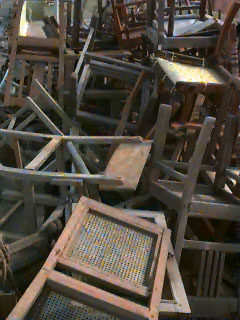
|
|
 |
|
Mali, our gardner, flanked by younger
competitors for his job.. His occupation (Mali is Hindi for gardner) became his name. |
|
| A Christmas Bonus: Dec. 22nd |
|
| Christmas time is arriving rapidly. Consequently, we should
now give the Christian members of our staff their Christmas bonuses. The custom is to give
a "thirteen month" bonus. In Jude’s case we didn’t pro-rate his bonus,
but gave him the full bonus of 3,000 rupees. He dutifully took the bonus home, and gave it
to his father, who magnanimously told Jude, "I don’t want your money —
it’s yours now", (big grin on Jude’s face), followed by "but you
should spend on your sisters and give them what they want". Poor Jude. Our other
servants are lining up. Mercy, the cook, asked for an "advance", apparently so
that she could buy gifts for her children. Our Hindi staff gets their bonuses when Diwali
arrives next year in early October. This, however, doesn’t stop them from switching
religions during the month of December. Lakhshmi, our maid, and Mali (Hindi for
"gardener") didn’t want to miss out and both queued up. Sue asked if they
were Christians. Lakhshmi admitted she wasn’t, and Mali claimed he was (Yeah,
right!). Mercy, who is Christian, translated Mali’s request to Sue, along with the
comment that Mali didn’t know how to pronounce the word "Christian". All
this led Sue to come up with the quote of the day, "If America is the land of
opportunity, then India is the land of opportunists". |
|
 |
Want to
buy a chair? |
|
|
| We don’t have any Muslim staff — more’s the pity. Sue is
getting to know Nassir, one of the seven Muslim brothers who run Seven Seas Furniture.
Shopping at Seven Seas is an only-in-India type of experience. Sue has become a friend
with a few women who participate in the Bangalore Women’s Club, an organization of
expatriate wives who have little to do, and lot’s of money to do it in. Many of the
spouses have become consummate furniture bargain hunters. One lady introduced Sue to
Nassir. His store is off of a side street, off of an alley, off of a crack between
buildings. In this decrepit place, on the roof of an old concrete house, is something I
can only describe as a furniture midden. The furniture, full of dry-rot, and missing arms
and legs, has been thrown up in the air, and has landed on top of this termite dung-hill
in a jumble that gives enough air to see what’s inside, and enough circulation to
give a good warm fire should the occasion arise. However, the gray, dingy, heap of refuse,
hides its real treasures — teak chairs, rosewood boxes, camphor chests, and mahogany
cupboards. What Nassir does is to wander over southern India and see what’s in the
junkyards and trash-heaps. He brings this rubbish home, and asks the customer to have some
vision. We found an old charred chest, painted and smeared, beaten and abused. He proudly
told us it was a dowry box . A century ago this bit of detritus contained the dowry of a
young girl who was probably married off at five, and whose dowry it had taken her father a
lifetime to save. In reflective black ink, I could dimly make out the letters MDYBOX,
which stood roughly for My Dowry Box! Lots of sanding, and polishing had been done to a
dowry box from the same period and place. The black ink turned out to be bright brass
inlay in serpentine designs that were both elegant and breathtaking. The wood was fine,
tight—grained, old growth teak. Inside was a chest of drawers as intricate as a
wooden puzzle, with sliding compartments, and secret cubbyholes for gold. Mirrors and
flowers carved from coral completed the dazzling assembly. Vision indeed. It was a
gorgeous antique. We bought the chest for 10,000 rupees ($300). With a few weeks of
carpentry, and elbow grease, and Nassir’s expertise, we hope to have a small chest in
our home with its own wonderful story to tell. |
|
|
|
|
|
|
|